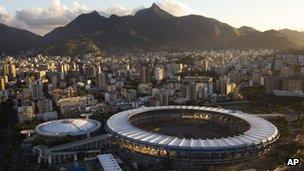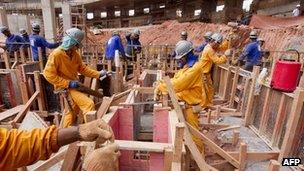Beer 'must be sold' at Brazil World Cup, says Fifa
- Published
- comments

Beer has been banned at Brazilian football matches since 2003
Beer must be sold at all venues hosting matches in the 2014 World Cup in Brazil, football's world governing body, Fifa, has insisted.
Fifa General Secretary Jerome Valcke said the right to sell beer must be enshrined in a World Cup law the Brazilian Congress is considering.
Alcoholic drinks are currently banned at Brazilian stadiums and the country's health minister has urged Congress to maintain the ban in the new law.
Brewer Budweiser is a big Fifa sponsor.
Mr Valcke is visiting Brazil to press for progress on the much-delayed World Cup law.
'Won't negotiate'
Fifa has become frustrated because voting on the legislation has been held up in Congress by the dispute over alcohol sales.
The Brazilian government has also failed to resolve differences with Fifa over cut-price tickets for students and senior citizens, and demands for sponsors of the World Cup to have their trademarks protected.
In remarks to journalists in Rio de Janeiro, Mr Valcke sounded frustrated with Brazilian officials.
"Alcoholic drinks are part of the Fifa World Cup, so we're going to have them. Excuse me if I sound a bit arrogant but that's something we won't negotiate," he said.
"The fact that we have the right to sell beer has to be a part of the law."
Alcohol was banned at Brazilian football matches in 2003 as part of attempts to tackle violence between rival football fans.
The measures have had limited impact, says the BBC's South American football correspondent Tim Vickery.
In order to drink, supporters tend to stay longer outside stadiums, areas that are harder to police than inside.
Much of the football violence in Brazil stems from club rivalries, our correspondent notes. Fans who follow the national side tend to be wealthier and include more women and families.

Mr Valcke criticised the pace of construction at Brazil's world cup venues
Health Minister Alexandre Padilha and other members of Congress have called for the ban to be maintained.
Mr Valcke said negotiations with Brazil over details of the World Cup had been slow.
"We lost a lot of time and we were not able to discuss with people in charge that are willing to make a decision," he said, adding that it was the first time a country was still in talks five years after winning the right to host the tournament.
During his visit to Brazil, Mr Valcke has been touring the stadiums in 12 cities where the 2014 World Cup will be played.
He criticised the pace of construction and said Brazil had not yet improved its infrastructure to the level needed to welcome visitors.
- Published8 January 2012
- Published2 December 2011
- Published29 February 2012